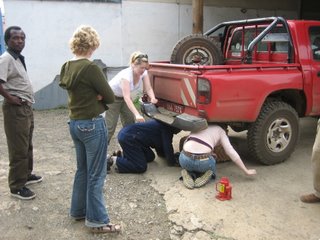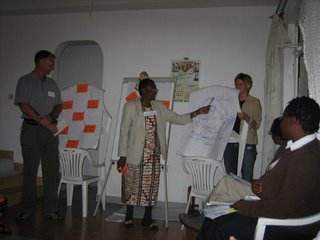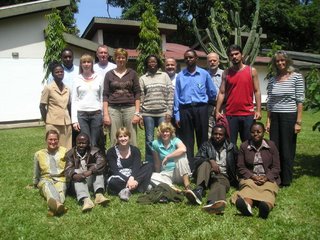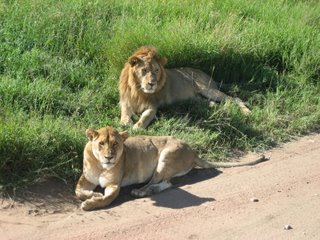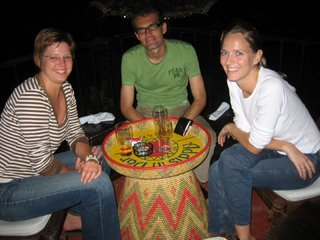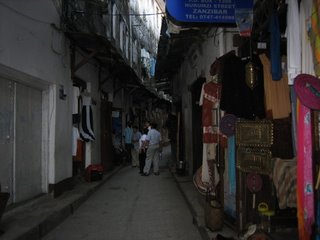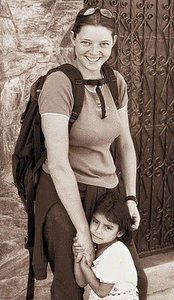On my first visit to Nepalgunj I got the opportunity to meet the two organisations I will be working with, namely DWO and CWD. In this post I will tell you about DWO, where I will be working 50 % of my time – sorry about the length but there is a lot to tell.
Dalit Welfare OrganisationDWO – Dalit Welfare Organisation – is a Nepali organisation working for the rights of Dalit people on local and national level. The Dalits are the people in the bottom of the caste system. I have written a bit about the caste system at the end of this post.
DWO was founded in 1994 and works with the vision to create a justifiable by eliminating caste discrimination. DWO is an organisation founded by Dalits working solemnly to help other Dalits. The organisation focuses on raising the livelihood of the Dalit societies by raising the self-esteem of Dalits and build institutional capacities on grass-root level.
In the communities DWO works with women’s groups. The organisat

ion helps the poor Dalit women to organise themselves in a group. This group then receives different kinds of training first and foremost in literacy and group formation process. Besides from that they are informed of their rights and DWO helps kill many myths about Dalits and how they are worth less than other people. Thanks to the efforts of DWO these women are beginning to see themselves as equal to their neighbours.
Through these groups the women also start a small saving scheme. The money they collect are given to women in the group, who uses them to start a small income-generating activity, so she in that way can support her family. After some month she will start to repay the loan and the money will be disbursed to other women.
During my visit in Terai I had the chance to visit two of these Dalit women groups and I was impressed with the work that DWO has done. Women, who previously was afraid to say their own name, now stood up and told me about their problems and the support that DWO had given them in order to take manners into own hands and improve their livelihood.
My work with DWO
Though DWO is a large national organisation I will only be working with the regional office covering the Mid-West region. The office is located in Kohalpur about 12 miles north of Nepalgunj. My work will be as advisor to DWO helping them become more efficient as an organisation. Amongst others I will help them improve their programme planning and implementation, revised their monitoring and evaluation system, strengthen their networking abilities and hopefully influence them with a bit of Danish working culture. There is enough work to do and it will be a very exciting job. The majority of my colleagues are Dalit women, who have worked their way from the women’s groups to the organisational level. Because of that very few of them speaks English. Ishwori (see the picture), the daily manager and one of the few men in the organisation, will be my counterpart and close colleague for the coming two years. Luckily, he speaks English, so in the beginning I will have to rely a lot on him. But he is a great guy who loves a good laugh, so I am sure that we will have fun working together. I am looking very much forward to getting started and will keep you posted on my work with DWO.
 The caste system
The caste system
The population of Nepal is, just like in India, divided into a caste system. The caste system is more than 1000 years old and at the time of its creation it divided people into groups depending on their profession. There are four main castes each with several 100 sub castes and it is almost impossible to keep track of the 3000 castes that exist in Nepal today. The top caste, Brahmin, deals with religious tasks (priest and teachers), the following caste, Kshatriya, takes care of the political issues (elite and warriors), trades – and craftsmen belong to the Vaishy caste and in the bottom of the hierarchy the Dalit people are – also known as casteless or untouchable.
Since the Dalits perform the “dirtiest” jobs in the country people from other castes do not wish to get into contact with these people. Despite the fact that caste discrimination was made illegal in 1990 the Dalits still suffers under the system. The untouchables, representing 20 % of the population, live under conditions similar to apartheid being discrimination against on all levels of society. They are not allowed to eat with people from higher castes or use the same water source. Almost daily I read about a Dalit being beaten up because he has been drinking from a public water tap. This not only applies to adults, last week I read about a 7 year old girl being beaten up by a teacher because she drank water from a public tap.
Because the Dalits do not have access to the same resources as the rest of the population the vast majority of them live in great poverty. Besides from this they also have a very low self-esteem because they were raised in a society that considers them as untouchable.
In the Hindu religion people believe in karma and reincarnation. For this reason the caste system still exists since people believe that they were born into their caste because of actions in their previous lives. This also means that when an organisation like DWO are fighting to abolish all caste discrimination they are fighting against very old and strong traditions and beliefs – however, DWO are fighting hard and have done an amazing job.
Read more about DWO on: www.dwo.org.np
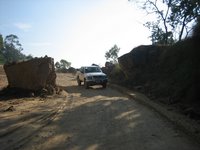 We had planned to leave Monday morning but due to a bad storm the night before it was postponed till Tuesday. At first I believed it to be the Nepali fear of rain that has caused this delay but once I saw the road and the many landslides I was quite glad that we had waited.
We had planned to leave Monday morning but due to a bad storm the night before it was postponed till Tuesday. At first I believed it to be the Nepali fear of rain that has caused this delay but once I saw the road and the many landslides I was quite glad that we had waited.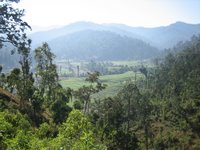 ogramme of the day which basically consisted of introducing me to our groups in the area. Surkhet is an area that has been badly affected by the conflict and great parts of the district have been under Maoist control. This means that my colleagues have been hesitant to visit the area and our groups here have received few visits from CWD throughout the last 10 years. It was quite easy to feel the dissatisfaction within our groups and they had also decided to act upon the lack of support by starting their own organisation. In principal a good idea expect for one thing; they have no money!
ogramme of the day which basically consisted of introducing me to our groups in the area. Surkhet is an area that has been badly affected by the conflict and great parts of the district have been under Maoist control. This means that my colleagues have been hesitant to visit the area and our groups here have received few visits from CWD throughout the last 10 years. It was quite easy to feel the dissatisfaction within our groups and they had also decided to act upon the lack of support by starting their own organisation. In principal a good idea expect for one thing; they have no money!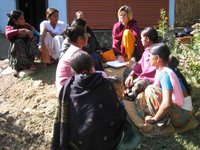 e has come to Nepal the money is pouring in from all sides and it is necessary to join the “race for funds”. It looks to be an interesting project for me to start on, even though it seems I would have to spend some time with these women first to ensure that they take an active part in the process. I have no idea of which organisations there are in the area so that is where they would have to step in – something I sensed they were not too keen on.
e has come to Nepal the money is pouring in from all sides and it is necessary to join the “race for funds”. It looks to be an interesting project for me to start on, even though it seems I would have to spend some time with these women first to ensure that they take an active part in the process. I have no idea of which organisations there are in the area so that is where they would have to step in – something I sensed they were not too keen on. credibl
credibl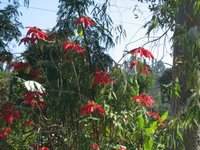 e beautiful area.
e beautiful area.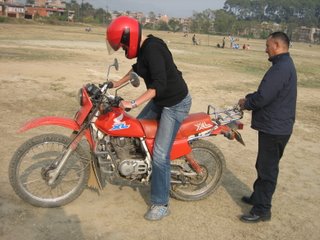
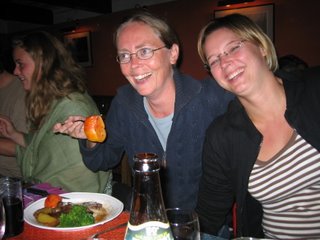
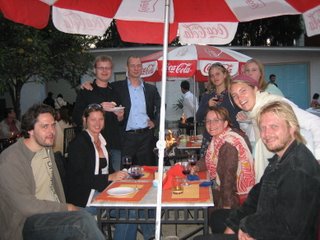 That was a short update on what I am doing these days. Unfortunately, I have also gotten a bit of a cold because of this horrible climate, but hopefully the two hours massage I am going to now will help on that….
That was a short update on what I am doing these days. Unfortunately, I have also gotten a bit of a cold because of this horrible climate, but hopefully the two hours massage I am going to now will help on that….

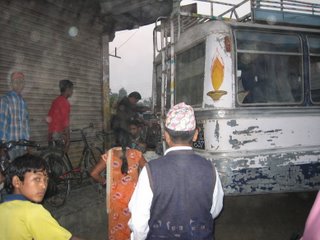
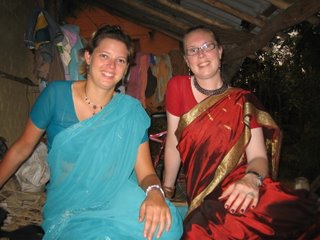
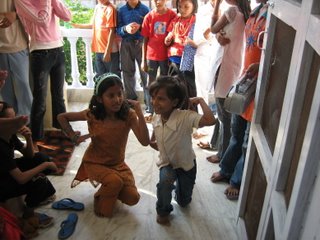


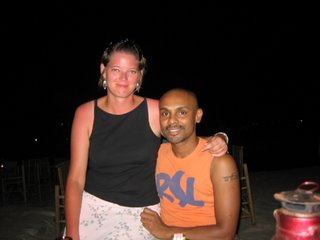
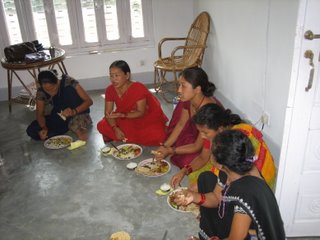
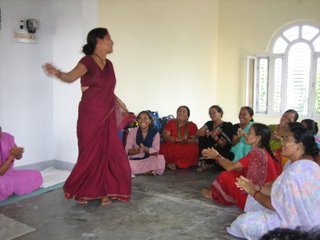
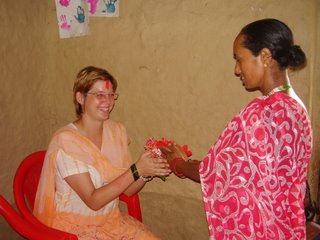
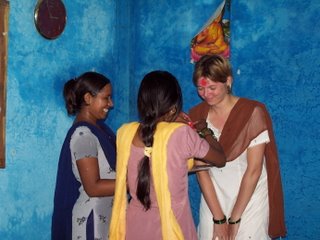
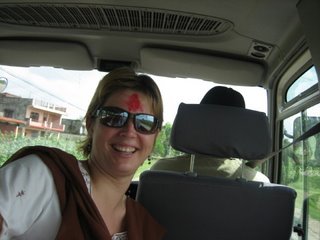
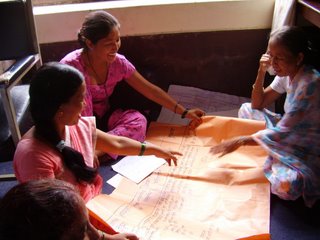



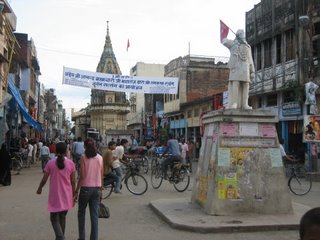

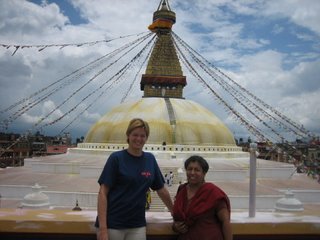

 …and then I turned 30 – and I have to admit that it feels pretty good to become a grown-up!!!
…and then I turned 30 – and I have to admit that it feels pretty good to become a grown-up!!!
